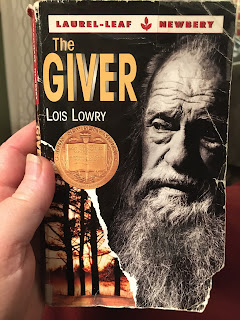It was a pretty little book with a puzzling title and a delicately sweeping image of a young girl in a red dress, clutching a object, with her hand open to the sky. Her face, lightly sketched, was wistful, peaceful. Plus that gold seal that calls to me, A Newbery Award winner! I plucked “The Higher Power of Lucky” by Susan Patron off the thrift store shelf, looking forward to discovering what it was about.
A book doesn’t have to sock you in the first couple pages to insure you don’t get bored and set it down. Sometimes it just has to intrigue you or ask a question or make you curious about what is going on with the character. The first couple paragraphs did that for me. I’d wondered about the title. Did it mean, being lucky gave the character power? Nope. “Lucky” is the name of the character.
Lucky is crouching behind the dumpster with her ear to a hole in the wall of Hard Pan’s Found Object Wind Chime Museum and Visitor Center. She is listening to Short Sammy tell the story of how he hit rock bottom, quit drinking, and found his “higher power.” She has heard lots of rock-bottom stories at all the twelve-step meetings behind that wall; gamblers, alcoholics, smokers and overeaters, but Short Sammy’s is her favorite. He had drunk a half gallon of rum listening to Johnny Cash all morning in his parked ‘62 Cadillac, then fallen out of the car when he saw a rattlesnake on the passenger seat biting his dog, Roy, on the scrotum.
Do tell.
Lucky is always a little disappointed with the stories. Because the people never say HOW they got their higher power. And that is what she needs to know, since she needs a higher power and has no idea how to get it. Gradually we learn that Lucky has a guardian, and that the story of her parents is very unfortunate. Stability for a kid is so important, and Lucky knows that even though things seem fine, you can’t trust they will stay that way. She thinks:
“…let’s say her Guardian just gave up and quit because Lucky did something terrible. The difference between a guardian and an actual mom is that a mom can’t resign. A mom has the job for life.”
The little hardscrabble desert town of Hard Pan is where Lucky lives. Her world is populated with interesting characters including her best friend, Lincoln, who is obsessed with knots; tying them, learning new ones, talking about them. Bridgette, the Guardian, is from France, and Lucky is worried that she will decide she has had enough of Hard Pan and Lucky and fly back home, leaving her with no other option but to go to an orphanage somewhere.
A little better communication would have helped stave off the inevitable crisis, but in reality, that is what happens. People don’t share the whole story or the plans with the kids, not realizing how deeply their minds are trying to process what’s going on, how maybe the kid thinks they have to do the work of controlling the very scary situations that seem to loom in their lives. And you cannot count on the child confiding their fears and conclusions to the grown-up in charge.
Lucky takes some lessons from the twelve-step stories she has been eavesdropping on and starts looking for signs for when she should act upon her secret plan. By now she is convinced that Brigette is going to leave her, and the best way to gain control over her life is to leave first. She is going to run away. The emotions Lucky goes through as she makes her running-away plans are plaintive. She cries as she imagines how everyone will miss her. And the next day she begins looking for the signs.
I really liked this book. It was gently funny in surprising little situations. Her budding awareness of Lincoln as someone she wanted to impress, as a pretty girl, was humorous. Her patience with Miles, the annoying little boy who always came over for cookies, added a layer to Lucky’s character.
I got this book at Salvation Army for about a buck.



